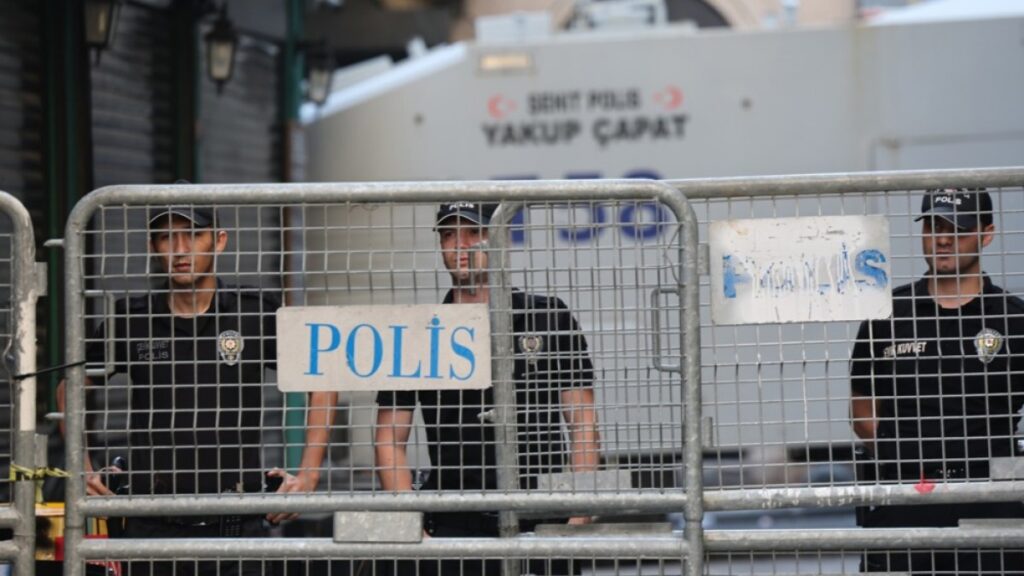
Police in Turkiye have detained four individuals following the publication of a controversial cartoon by the satirical magazine LeMan. The cartoon, which critics claim depicts Prophet Muhammad and Prophet Moses shaking hands in the sky amidst a war-like scene, has sparked significant backlash. LeMan, however, denies these allegations, asserting that the cartoon has been misinterpreted.
The cartoon, released last week, quickly drew ire from government officials and religious groups across Turkiye. On Tuesday, the Istanbul chief public prosecutor’s office announced a formal investigation under charges of “openly insulting religious values.” The situation escalated further when Interior Minister Ali Yerlikaya shared a video on social media platform X, showing the arrest of cartoonist Dogan Pehlevan on Monday.
Yerlikaya expressed strong condemnation, stating, “I strongly condemn the shameless caricaturing of our Prophet. This is not press freedom. This is not freedom of expression. These provocative acts, which insult our sacred values and deeply hurt Muslim consciences, will not go unpunished.” He revealed that a total of six detention orders had been issued, with two individuals still overseas and yet to be apprehended.
Legal Proceedings and Public Reaction
Alongside Pehlevan, the magazine’s graphic designer and two other senior staff members have been detained. Justice Minister Yilmaz Tunc confirmed that the investigation is proceeding under Article 216 of the Turkish Penal Code, which criminalizes “incitement to hatred and enmity.”
In response to the public outcry, LeMan issued a statement on X, apologizing to readers who were offended but maintaining that the cartoon was misinterpreted. The magazine explained that Pehlevan’s intent was to highlight “the suffering of a Muslim man killed in Israeli attacks” and denied any intention to mock Islam.
“The name Muhammad is among the most common in the Muslim world in honour of the Prophet. The cartoon does not portray him, nor was it intended to disrespect religious beliefs,” LeMan stated, accusing critics of deliberately distorting its message.
LeMan has called for an investigation into what it describes as a targeted smear campaign and has advocated for stronger protection of press freedom.
Protests and Social Unrest
As tensions rose, videos emerged online showing crowds of protesters marching to LeMan’s office in Istanbul. The demonstrators were seen kicking the building’s doors and chanting slogans, underscoring the deep-seated emotions stirred by the cartoon.
This incident has reignited debates in Turkiye regarding the delicate balance between free expression and religious sensitivity. The country, which straddles the line between secularism and a predominantly Muslim population, has long grappled with these issues.
Historical Context and Expert Opinions
Historically, Turkiye has experienced similar controversies where artistic expressions have clashed with religious sentiments. In 2005, the publication of cartoons depicting Prophet Muhammad in a Danish newspaper led to global protests, including in Turkiye. This event highlighted the complex interplay between freedom of expression and religious respect.
Experts suggest that such incidents often serve as flashpoints, bringing underlying societal tensions to the forefront. Dr. Aylin Yildiz, a sociologist specializing in media and religion, notes, “These events are not just about the cartoons themselves; they reflect broader societal conflicts and the struggle to define national identity in a rapidly changing world.”
Implications and Future Outlook
The current situation presents a significant challenge for Turkiye’s authorities, who must navigate the fine line between upholding freedom of expression and maintaining public order. The outcome of this investigation could set a precedent for how similar cases are handled in the future.
As the legal proceedings continue, the international community will be closely watching Turkiye’s approach to balancing press freedom with religious respect. The case underscores the ongoing global debate over the limits of free speech in increasingly diverse societies.
Moving forward, it remains to be seen how Turkiye will address the tensions between secular and religious values, a challenge that is likely to persist as the nation continues to evolve.






